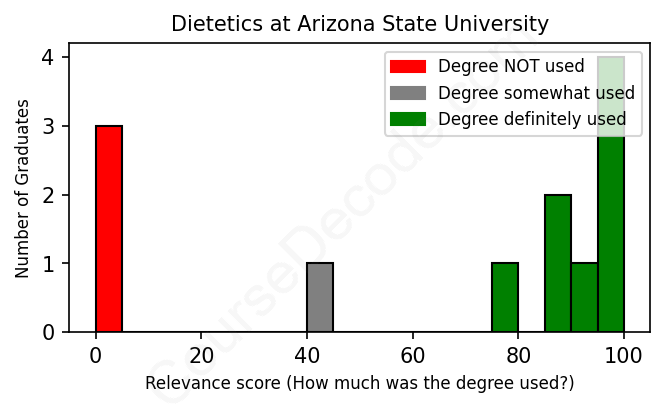
First, some facts. Of the Dietetics graduates from Arizona State University we've analyzed , here's how many have used (or NOT used) their degree in their career:

These are estimates based on AI analysis of 12 LinkedIn profiles (see below).
The verdict? Slightly below average. Overall, with an average relevance score of 65%, Dietetics graduates from Arizona State University have a slightly lower likelihood (-2%) of finding work in this field compared to the average graduate across all fields:
And for comparison, here's the chart for all profiles we've looked at across all degrees.
Also, after graduating, 41% of these graduates have pursued further education other than another Bachelor's degree (such as a Masters degree or other), compared to the average across all profiles of 35%. This suggests you may need more than just a Bachelors degree to be competitive as a Dietetics graduate.
See the details:
|
Relevance score: 85% We think this person has gone into a career highly relevant to their degree. We think this person has gone into a career highly relevant to their degree.
DEGREE INFOGraduated in 2014 from Arizona State University with a Bachelor of Science (B.S.) in Dietetics. Also pursued further education since (see below). JOB HISTORY SINCE GRADUATIONDietetic/Public Health Intern Cerenity Senior Care Aug 2014 - Dec 2014 Dietetic/Public Health Intern  Schools of Eastern Carver County Jan 2015 - Mar 2015 Dietetic Intern  St. Cloud Hospital May 2015 - Aug 2015 Dietetic/Public Health Intern  Smiley's Clinic Sep 2015 - Dec 2015 Dietetic/Public Health Intern  Family Education Diabetes Series Sep 2015 - Dec 2015 Dietetic/Public Health Intern  Lifestyle Management Clinic Sep 2015 - Dec 2015 Dietetic/Public Health Intern  Ramsey County WIC Jan 2016 - Apr 2016 Graduate Research Assistant  University of Minnesota Aug 2014 - May 2016 Dietetic/Public Health Intern  Chickasaw Nation Jun 2016 - Aug 2016 WIC Registered Dietitian & Certified Lactation Counselor  Jefferson County Public Health May 2017 - Nov 2019 FURTHER DEGREES DONE SINCE GRADUATINGMaster of Public Health (MPH)University of Minnesota-Twin Cities 2014 - 2016 ABOUTI am a Registered Dietitian with an MPH from the University of Minnesota. I completed my BS at Arizona State University in Dietetics, minored in Global Health and was a part of Barrett, the Honors College. My primary professional interests include community and public health, community-based interventions and lifestyle management. |
The top 10 most common jobs done by the graduates we've analyzed (ranked most common to least) are:
When looking at the job profiles of people who studied Dietetics at Arizona State University, it's clear that there's a mix between positions that are closely related to their degree and others that aren't. Many graduates have found roles like Registered Dietitian, Dietetic Technician, and Nutrition Educator, which directly apply the specialized skills and knowledge they gained during their studies. These jobs make full use of their understanding of nutrition, dietary guidelines, and health promotion, showing a strong connection to the field of dietetics.
However, a noticeable number of graduates have taken jobs in food service or management roles, such as servers and operational managers, where dietetics knowledge isn't particularly relevant. For instance, positions at organizations like Massage Envy or various hotels focus more on customer service and operational tasks rather than nutrition-related expertise. This highlights that while there are significant opportunities for dietetics-focused roles, some graduates seem to have veered off into other fields that don’t fully utilize their degree. Overall, while many have secured relevant roles, there is certainly a portion of graduates who have pursued careers outside of dietetics.
Here is a visual representation of the most common words in job titles for Dietetics graduates (this is across all Dietetics graduates we've analyzed, not just those who went to Arizona State University):

It looks like graduates from the Dietetics program at Arizona State University have taken a variety of paths after earning their degrees, but many seem to stick fairly close to careers related to nutrition and dietetics. For their first jobs out of college, a good number start with internships or entry-level positions in nutrition services, like the dietetic technician roles or nutrition assistants at schools and healthcare facilities. This makes sense since many graduates need to gain practical experience before becoming fully registered dietitians, which usually involves completing internships and passing exams. There are also a few who seem to drift into unrelated fields, such as servers at restaurants or roles in customer service, but that seems less common.
As graduates move further along in their careers, often about five to ten years post-graduation, many of them find themselves in more substantive positions directly related to dietetics. We see some securing roles as registered dietitians in reputable healthcare settings like the Mayo Clinic or in public health organizations, which indicates a promising trajectory. Others climb the ranks within their companies and take on management roles, while some move into specializations like wellness coaching or become nutrition educators. Overall, while there's a fair mix of job trajectories, it's clear that many of these graduates end up in solid, relevant careers that leverage their education in dietetics, with a number progressing into leadership roles or specialized fields in nutrition.
So, getting a Bachelor’s degree in Dietetics, like the one at Arizona State University, can be a mix of challenging and manageable, depending on your study habits and passion for the subject. Generally, it covers a lot of scientific stuff, like nutrition, biochemistry, and anatomy, which can definitely feel tough if you're not super into those areas. Plus, there are hands-on components and internships that require some serious commitment. However, if you're really interested in health and nutrition, it can be more enjoyable and feel less like a slog. Overall, it’s probably a bit on the harder side of average, but with dedication and a love for the subject, you can totally handle it!
Most commonly, in the LinkedIn profiles we've looked at, it takes people 2 years to finish a Bachelor degree in Dietetics.
So, when you look at the job history of these Arizona State University Dietetics grads, it seems like they’re doing pretty well overall. The ones who landed roles in hospitals or health organizations like the Mayo Clinic seem to be on a solid financial path, likely making decent salaries as registered dietitians. On the other hand, some of the folks took on roles like serving and working at schools, which typically don’t pay as well. The variety in their careers ranges from managerial positions to more entry-level roles, but it’s clear that those who stuck with dietetics and advanced to registered dietitian positions have likely boosted their income significantly. Overall, it looks like there’s a good mix of success, especially for those who leveraged their degrees in the right places!
Here is a visual representation of the most common words seen in the "about" section of LinkedIn profiles who have a Bachelor degree in Dietetics (this is across all Dietetics graduates we've analyzed, not just those who went to Arizona State University). This may or may not be useful:

Here are all colleges offering a Bachelor degree in Dietetics (ordered by the average relevance score of their Dietetics graduates, best to worst) where we have analyzed at least 10 of their graduates:
| College | Score | Count |
|---|---|---|
 University of Delaware University of Delaware
|
87 | 13 |
 Purdue University Purdue University
|
79 | 10 |
 University of Kentucky University of Kentucky
|
76 | 10 |
 Michigan State University Michigan State University
|
74 | 16 |
 Brigham Young University Brigham Young University
|
73 | 12 |
 Iowa State University Iowa State University
|
72 | 13 |
 Florida State University Florida State University
|
67 | 11 |
 Arizona State University Arizona State University
|
65 | 12 |